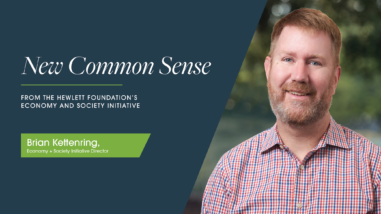National Academies of Sciences, Engineering, and Medicine
For A Report Assessing The US Department Of State’s Science And Technology Capacity And Assets
-
Amount$100,000
-
Program
-
Date Awarded4/23/2013
-
Term18.0 Months
-
Type of SupportProject
Overview
The U.S. Department of State has requested that the National Academy of Sciences conduct a current, unbiased assessment on the Department's capacity to draw effectively on U.S. science and technology assets in developing and achieving U.S. foreign policy objectives. Recent strengthening of the department's science and technology assets have been based on recommendations from a (now-outdated) 1999 report, which this grant would seek to update. Non-government funding is necessary in order to avoid conflicts of interest in the Academy's provision of advice to a Federal Agency. Such a report would examine the changing environment for the role of science and technology in diplomacy over the past decade, exploring issues of bioterrorism, climate change, communicable diseases, water scarcity, energy, oceans and more, to answer the question: "How can the department use its limited resources most effectively in addressing key science and technology issues of the future?" This grant would support the preparation, review, and dissemination of this report.
About the Grantee
Grantee Website
www.nas.edu
Address
500 Fifth Street, NW, Washington, DC, 20001-2736, United States
Grants to this Grantee
for the Roundtable on Macroeconomics and Climate-related Risks and Opportunities
Established in 1863 by an act of Congress, the National Academies of Sciences, Engineering, and Medicine provides independent, objective analysis and advice to the nation and conducts other activities to solve complex problems and inform public policy decisions. Members are elected by their peers for outstanding contributions to research. This grant supports the establishment of a Roundtable on Macroeconomics and Climate-related Risks and Opportunities by the National Academies, with a goal of improving understanding of how the physical and transition effects of climate change relate to and affect macroeconomic performance and the implications for fiscal, monetary, and financial stability policies. The Roundtable will be a venue for federal agencies and cross-disciplinary experts in academia, industry, and nongovernmental organizations to discuss challenges associated with incorporating climate change risks and opportunities into macroeconomic analysis.
for a project researching social media effects on adolescents and children
Since 2016, the research on the health effects of social media on adolescents and children has evolved. A number of studies suggest there is little or no association between social media usage and mental and physical health problems, while other studies indicate a link. The National Academies provides independent, objective advice to the nation on matters related to science and technology. This grant will support a committee of the National Academies to examine the current research and make conclusions about the impact of social media on the mental and physical health and well-being of adolescents and children. The committee will make recommendations for future research, as well as steps that parents, social media companies, and public officials can take to maximize potential benefits and minimize potential harms of social media for adolescents and children.
for a Committee on National Statistics panel
The National Academies of Sciences, Engineering, and Medicine provide independent scientific advice to the government. Its Committee on National Statistics will convene an expert panel on an integrated system of household income, consumption, and wealth statistics, currently produced by multiple agencies. Available series are conceptually inconsistent and insufficiently accurate, timely, or detailed (geographically or demographically) for policy or research. Series differ as to the extent of inequality and other measures of households’ economic well-being, clouding policy debates and public understanding. The panel’s report will recommend steps toward an integrated system that can better illuminate households’ economic circumstances, as well as inequities in their ability to achieve an adequate standard of living and provide education and homeownership opportunities for their children.



